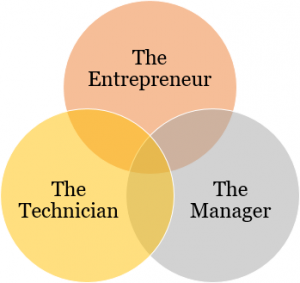Vision
To be the principal go-to advisor for Entrepreneurs, financiers, and promoters of investment capital, as experts on business and financial structures for sustainable growth through improved financial management in the organisation.
Purpose
Helping SME’s get world-class internal control structures, processes and financials.
Basis of our philosophy
We believe that an organisation has three primary roles that MUST be fulfilled for success[1]. While we have described them as separate roles, they are not necessarily mutually exclusive. As we develop individually and as a business, we learn to combine different elements. Individuals, just like business, normally start by developing their technical strengths. This is closely followed by management skills and expertise. Lastly comes the Entrepreneurial mind-set. As such, the best individuals combine, two or all three in their day to day activities.
The Entrepreneur
The Entrepreneur is one of the roles played in an organisation. She is the reason that an organisation has a vision, direction and purpose. The entrepreneur carries the vision of where he sees the organisation going and shares that vision with his partners, shareholders, stakeholders and staff. A strong entrepreneur gets the commitment of all stakeholders, to meet their goal. Entrepreneurs rarely need to be of a similar background to the organisation they are running. As such, it is not important that the CEO of a bank, be a professional banker. The best entrepreneurs adapt quickly and learn about new areas. They surround themselves with good managers and technicians.
A common trait of entrepreneurs is their ability to live and work outside their comfort zone.
A typical example is a restaurant. A good entrepreneur will consider all elements of what makes a successful business. From location to cuisine, from pricing to service levels and how they all interact with each other.
The Technician
He is the very core of the business and normally referred to as the bread and butter of the organisation. He works to delivers on the vision and direction of the entrepreneur. The technician knows the nitty-gritty of what needs to be done, when it needs to be done, and how to do it best. The best technicians are always looking for more effective and efficient ways to deliver against the expectations of the business. These expectations vary from those of the Entrepreneur, the shareholders, the employees, the customer, regulators and other stakeholders.
In the context of a restaurant, while location, cuisine, price is critical for a restaurant, no culinary experience is better than its chef. No service delivery is better than its waiters, hostess, and/or security. No environment is better than its maintenance.
Because of these fundamental differences between the entrepreneur and the technician, organisations normally find these two roles in conflict. Even when one person plays both roles, they will normally find a conflict within themselves. The Technician part of the individual feels that his Entrepreneurial element is over-promising. Without a good technician, a business and entrepreneur will not move forward or succeed.
The Manager
The final role, is that of the Manager. He takes the vision, ideas, dreams of the Entrepreneur and converts them into strategies, plans, and budgets. Using his experience supported by applicable tools such as Corporate Governance and Control Environment principles, he gives the Entrepreneur a conduit through which he can articulate, refine, develop, and communicate his vision.
The manager engages with the technician to review the vision and cultivates his excitement and concerns. He takes those factors and converts them into a risk management plan. He then facilitates proactive interaction between the Entrepreneur and the Technician to develop mitigating actions through Control Activities.
The Manager puts into play structures and systems to capture the results of what the Entrepreneur and the Technician are doing. They develop accounting and financial reporting systems that can measure the benefit accruing to the business based on actions of the Entrepreneur and Technicians. They identify Key Performance Indicators that measure efficiency and effectiveness. They take that data, captured by the structures and systems, and converts it into information. Critically, a good manager reports it to those who need that information for decision-making.
Note that all roles have their specific and relevant ‘management’ structure. Entrepreneurs need to identify, recruit and develop other entrepreneurs. These can come from within the organisation or outside. The Technician will also recruit, train, develop and provide feedback to other technicians. Technicians will take time to identify better ways of delivering on their goods and services. Managers provide a code of ethics and culture of delivery to other managers.
The managers work closely with the other two roles to give them a framework and guidance on how to recruit, develop, train, and where necessary, separate with people.
Where we come in
3K&L specialises in providing those services required in the Manager role. We can develop structures and systems to help you grow. We work closely with entrepreneurs in their organisations for sustainable growth.
[1] [1] THE E-Myth REVISITED © 2007 Michael E. Gerber. All rights reserved

